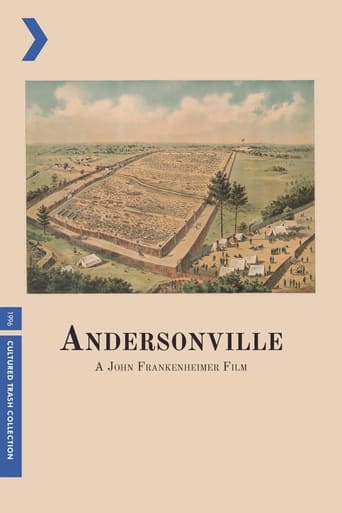bkoganbing
To this day Andersonville will connote unspeakable barbarism and suffering in a prisoner of war camp. Yet one has to note that part of the problem was the lack of resources the Confederacy had to maintain prison facilities like Andersonville or Libby.Before Ulysses S. Grant took command of the overall Union Army the Union and Confederacy had regular prisoner exchanges. It was shown however that prisoners never obeyed the terms of their parole, but got back into the fight. Grant changed all that when he stopped prisoner exchanges. With the north having so much more population it was only a matter of attrition before the south had to give up. The south had not the resources to maintain prison facilities, civilian or military. The south could barely feed its own population. Note the adolescent prison guards on the stockade wall. Kids that young were in the Confederate Army in the end and not just drummer boys.However the German emigrant colonel played by Jan Triska employed some barbarism of his own. He encouraged 'The Raiders' a group of some of the lowest low lives you'll ever see to form among the prisoners, to rob them, to terrorize them, to inform on them when necessary. That was a particular Andersonville touch in penal discipline. No big names are in Andersonville, but that added to the realism. John Frankenheimer got an ensemble performance second to none and an Emmy to boot. Standing out are Frederic Forrest as the Massachusetts sergeant who sees his men the best he could, William Coffin as the head of the 'Raiders', and his second in command William Sanderson the last word in bottom feeders and young Blake Heron as a drummer boy prisoner.One thing that producer Ted Turner did not do was get too explicit as to just what young Heron might have had to deal with among a bunch of isolated and starving men. Then again this was a made for TV movie, on the big screen prison rape might have been dealt with.Andersonville is an excellent production, a must see film for anyone even mildly interested in the American Civil War.
Venge
Having looked forward to seeing this film for quite a while, I was quite let down when I finally managed to view it. Andersonville is a story that needed to be told, but this telling of the tale rattles and rambles trying to find its sense of direction. The production suffers from a rather poorly written script and mediocre acting. There were some decent scenes, and a few good performances, but by and large this was a rather jumbled, boring, over-long, predictable mess. It could have been, and deserved to be, so much more.So unless you really have to see a movie about this notorious prisoner of war camp, I'd give this one a miss.
dcheek56
I believe this is one of the best and most fair-minded Civil War movies ever made. The actors all give a first-rate performance, and the director keeps the movie focused and on track, without laying blame to either side. Most of the movies facts are historically accurate and the dialog reproduces (in my opinion) the attitudes of the times.The Raiders were a historical reality, and the trial and subsequent execution were unique during the Civil War. While many parts of the movie are memorable, the most poignant scene is at the end when one of the major characters is buried in the cemetery. The camera zooms in on the white-painted headboard with his name, and then pans back to show you the real, present-day cemetery - with this particular headstone name in the center. Seeing nearly 13,000 headstones of real-life prisoners who died at Andersonville really puts the film in perspective.
Gettysburg2000go
As a practicing Civil War re-enactor, I have found myself drawn into viewing this movie several times. I considered the movie to be the result of a very thorough and extensive research done by its creators. Everything was completely in accordance with what we in the re-enacting community call "of the period". I am speaking of authenticity. I have studied the true-life accounts left to us in the words of both Union and Confederate soldiers found in exerpts from the pages of their personal diaries, and in so doing, I have been able to combine this newly acquired knowledge with other experiences and studies related to this time period in our nation's history. After doing this, I was then able to formulate unbiased opinions about the movie.We have to remember that the people of the middle nineteenth century were men and women just like us. There was nothing "mysterious" about their ways, their words, their fears and all their other emotions. I felt that these natural human reactions and outlooks were well portrayed by the actors of the movie, "Andersonville".



